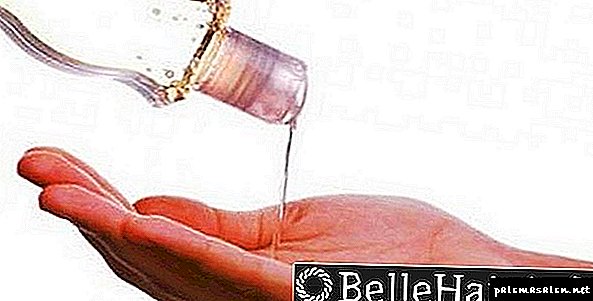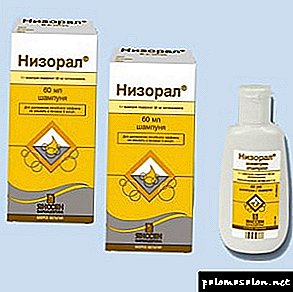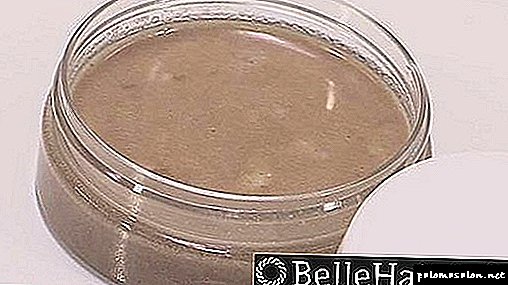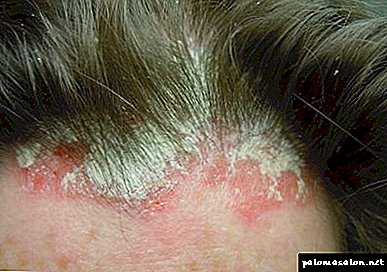Choosing shampoo, you need to pay attention to its composition. High-quality shampoo contains about 30 substances, so it is really difficult to understand the composition without special knowledge. In the list, the names of ingredients are usually arranged in descending order.
1. Sodium Laureth Sulfate.
Responsible for foaming. Initially, SLS was produced to clean mechanisms, machines. The chemical composition of this component allows it to enter the blood through the pores of the skin and accumulate in the tissues of the liver and the heart of the eyes. This is a toxic mutagen that can disrupt metabolic processes. Sodium sulfonate really removes hair from fat, but also dries the scalp.
2. BHT (Butylated Hydroxytoluene).
Interferes with oxidation of fats at interaction with air, carcinogen. He is already in some countries as a component of cosmetics is prohibited.
3. Sodium Lauruulaureth Sulfate.
He is sodium lauryl or laureth sulfate. It is used because of the cleansing properties, often masked as "Coconut Hood". This is a cheap and harmful product of refining. He at times increases the tendency of a person to allergic reactions, causes peeling of the skin, rash.
4. DEA, TEA.
Very often found in the composition of shampoos, both cheap and expensive. They contain ammonia, which with long-term use has a toxic effect on the entire body, causes allergies, eye irritation, and dry scalp.
5. Sles (sodium laureth sulfate.
This component is softer than that described at number 1 SLS, it is often used in baby shampoos. Sles is harmful, but its effect is rather short-term and does not have the ability to accumulate in the body. It just needs to be thoroughly washed off. Only who knows about this? And so carefully we wash our hair?
Why choose shampoos without sls?
Sodium lauryl sulfate is a cheap detergent derived from petroleum with the addition of palm oil. He quickly copes with pollution and whips well into the foam, but this is where his positive characteristics end. The cleaning properties of this substance are used to clean engines from grease and oil. SLS instantly penetrates into the blood vessels, accumulating in organs, it affects almost all functions and systems of the human body. Able to cause cataracts of the eyes, as well as developmental delay in children. In addition to all the above, this component destroys the hair follicles, contributes to the loss of strands and the appearance of seborrhea.
What is dangerous lauryl sulfate in shampoo?
Organic Organic Cosmetics It has long been an alternative substitute for sulfate shampoos. Manufacturers of such shampoos replace harmful substances with more neutral ones - cocoglucoside (extract from coconut oil and glucose), as well as laureth sulfosuccinate. Sodium lauryl sulfate is indicated on packages as sls. This is an insanely harmful component, whose action has been proven and is as follows:
Sulfates in shampoos
Take your favorite shampoo and carefully read its composition. I bet that the first in the list of ingredients will be either SLS, or SLES, or ALS, or ALES. This is all nothing more than washing the basics of shampoo. And from a chemical point of view - the usual sulfates. Can chemistry benefit the body? In most cases, of course, no. And sulfates are no exception.
Adding sulfates to shampoo is the easiest way to achieve a thick foam, as well as remove skin fat from hair and scalp. And the cheapest way. The concentration of sulphates in shampoo is different: there are more of them in the products for oily hair, and a little less for dry and normal hair. SLS and SLES are used in more expensive shampoos, and ALS and ALES are cheaper. Finding a shampoo without sodium sulfate, even in a big shopping cent, is not an easy task!
For a long time it was believed that sulphates in cosmetics are one of the factors that provoke the development of cancer. But in 2000 a report was published in the official journal of the American College of Toxicology that dispelled this myth.
Long-term studies have shown that sulfates are not carcinogenic. It would seem that you can breathe easy and continue to use your favorite sulphate-containing shampoos. But it's not that easy! Have you ever wondered why after using this or that remedy you get itchy skin, allergies, and your hair becomes dull and brittle? And here we are again returning to sulfates and their influence on our health.
Scientists have shown that a high concentration of sulfates in shampoos can irritate the skin and mucous membranes of the eyes, and the penetration of these substances into the body can lead not only to damage to the organs of the respiratory system, but also to disruptions of the brain.
Lauryl sulfate, laureth sodium sulfate, ammonium lauryl sulfate - what's the difference?
As we have already found out, the most common sulphates in our shampoos are SLS and SLES. They are often confused, but in reality they are two different ingredients that differ not only in their chemical properties, but also in the degree of danger to the organism.
Sodium lauryl sulfate (Sodium Lauryl Sulfate or SLS) is an inexpensive detergent derived from coconut oil and oil. This is the most dangerous ingredient in shampoos for hair. It very quickly removes fat from any basis, and also perfectly foams. That is why it is widely used in industry for getting rid of fat in garages and garages, engine degreasing and in car wash products.
Also, SLS is indispensable for the cosmetic industry. With his help, in scientific research and in cosmetic clinics, they cause irritation on the skin of people and animals during various experiments. And then test new drugs for the treatment of such irritations.
Scientists at the Medical College of the University of Georgia conducted studies that showed that SLS very quickly enters the human body through the skin, enters the eyes, liver, kidneys, heart and brain of a person and stays there for a long time. The same research suggests that SLS is able to change the protein composition of the cells in our eyes and cause a cataract.
And one more "surprise" of this sulfate: it can cause developmental delay in children. It seems to me that this is already enough to permanently abandon the use of shampoos that contain sodium lauryl sulfate. And the "bonus" from this sulfate: it contributes to hair loss, the destruction of hair follicles, as well as the appearance of dandruff. I think questions about the “security” of SLS no longer arise.
Please note that some manufacturers mask this sulphate with the beautiful name "ingredients derived from coconuts". My advice: avoid such cosmetics if their quality is not confirmed by international quality certificates.

Laureth sodium sulfate (Sodium Laureth Sulfate or SLES) - The ingredient is used in shampoos and shower gels for the formation of foam. Also, like SLS, it is very cheap and forms the soap base of cosmetics. It is used as a shampoo thickener to create the illusion of an expensive tool. SLES is used in the textile industry as a wetting agent. In terms of the degree of harm to our body, laureth is somewhat inferior to lauril. But scientists also call it one of the most dangerous chemicals in cosmetics. SLES causes severe irritation of the mucous membranes.
Since this substance is used not only in shampoos, but also in shower gels and intimate hygiene products, you should know that SLES washes away the natural protective layer of the skin, which greatly reduces the resistance of our body to bacteria. Lauret is an excellent conductor of toxic substances. It easily enters the compounds with other ingredients, forms nitrates and dioxins and very quickly carries them to all organs. SLES is highly allergenic, therefore it is completely contraindicated for use by pregnant women and children.
ALS and ALES are ammonium lauryl and laureth sulfate. These sulphates dissolve very quickly in water and foam well. That is why they are often used in cosmetics such as shampoos or shower gels. The molecules of these substances are very small, so they easily penetrate through the skin into the body. Very aggressive, are carcinogenic. Fortunately, ammonium lauryl sulfates ALS and ALES are used in cosmetics much less frequently than other sulfates.
Sulphate-free shampoos: what's the use?
An alternative to shampoos with sulfates is only natural and organic cosmetics. As a rule, the quality of any organic cosmetic product is confirmed by an international certificate. Manufacturers of sulfate-free shampoos replace sulfates with vegetable components: lauret sulfosuccinate (lauret sulfosuccinate), lauryl glucoside (lauril glucoside), cocoglucoside (cocoglucoside), derived from coconut oil and glucose. And although the names of these substitutes, too, "give" chemistry, but you can be quite sure of their safety and organicity.
To summarize: what is the use of shampoos without lauryl and laureth sulfate? Sulfate-free shampoos:
- Do not violate the natural pH environment of the body, do not dry or irritate the skin,
- The risk of dandruff baldness, acne, eye disease is minimized,
- There is no risk to the health of babies,
- Hair will be thick and strong, less brittle, will not lose color,
- And yet: the production of shampoos without sulfates pollutes the environment much less!
Please note that shampoos that contain natural detergent bases do not foam as intensively as sulphate-containing shampoos. But this does not mean that such cosmetics purify the hair worse.
Natura Siberica sulfate-free shampoos

Natura Siberika is the only Russian brand whose product quality is marked with the ICEA certificate. The entire series of shampoos does not cause allergies or itchy scalp. Many buyers in their reviews write that after regular use of cosmetics of this brand hair less dirty, which allows you to move away from daily shampooing. Of course, this does not mean that dirt will stick to your hair less. But non-sulfate shampoos allow you to regulate the production of sebum, which means that your hair gets less fat. Think about it, because some 20-30 years ago we washed our hair once a week, and at the same time our hair looked great. And all because SLS and SLES have not yet been used in our shampoos.
The most popular sulfate-free shampoos Natura Siberica
- Shampoo for tired and weak hair
- Shampoo Protection and Gloss for dyed and damaged hair
- Neutral shampoo for sensitive scalp
Shampoos without lauryl sulfate "Grandmother Agafi's recipes"

On the Internet you will find an almost equal number of both supporters and opponents of the products of this Russian cosmetic factory. But no one can argue with the fact that there is a large series of non-sulfate shampoos in this cosmetic line. The most important problem with the use of these cosmetics is that the hair gets used to organic matter for a very long time. But wait a couple of weeks, and your hair will delight you with the restored color and thick volume,
The most popular sulfate-free shampoos Grandmother Agafya's recipes
- Shampoo Hair Series: Black Agafya Shampoo against dandruff
- Shampoo Hair Series: Hot-water Agafya Everyday Shampoo
- Shampoo against hair loss based on five soap herbs and burdock infusion
Shampoos without sls LOGONA

Lagon is a German brand whose products are certified by BDIH. This quality mark automatically excludes the use of sulphates or parabens as ingredients. Shampoos of this brand are very often used as a remedy for hair. Choose the right product for your hair type and to solve exactly your problem: hair breakage, dandruff, dry or greasy hair, etc.
- Bamboo Cream Shampoo
- Shampoo Volume with honey and beer
- Juniper Dandruff Shampoo
Shampoos without sodium laureth sulfate Aubrey Organics
Aubrey Organics brand shampoos: one list of international certificates confirming product quality speaks for itself: NPA, BDIH, USDA. These certificates, without exception, prohibit the use of chemistry in cosmetics. Therefore, you can safely buy shampoos of this brand! According to the manufacturer (which, by the way, is supported by customer reviews), all products of this brand are suitable for people with sensitive and allergic skin.
- Green Tea Hair Treatment Shampoo Green Tea Treatment Shampoo
- Swimmers Normalizing Shampoo for Active Lifestyles (Normalizing shampoo for an active lifestyle)
- GPB-Glycogen Protein Balancing Shampoo (Glycogen Protein Balanced Shampoo)
Sulfate-Free Baby Shampoo

For many mummies, it is extremely important to find a non-sulphate baby shampoo - after all, it doesn’t bite the eyes of the baby, with it the child is not at risk of skin diseases (such as eczema). Even if you have already bought a sulfate-free shampoo for yourself, I do not recommend using it to wash your baby. The skin of the baby is much more tender and more often susceptible to allergic reactions. Below is a list of shampoos without sls specially designed for babies.
- Yes To Baby Carrots Fragrance Free Shampoo and Body Wash
- Avalon Organics Gentle Tear-free Shampoo & Body Wash
- Baby Bee Shampoo and Wash
As you can see, our shampoos, literally, are full of unpleasant surprises. And not only shampoos, sulphates also contained in shower gels, liquid soaps and toothpastes. Therefore, before buying, carefully read their composition, pay attention to the availability of international quality certificates. Better yet, do the shampoo at home with your own hands - because this is the only way you can be 100% sure about its safety and quality.
Watch a video on the topic: Habitat. Shampoo on your head
The concept of SLS. Harm that he bears
SLS in shampoo is a harmful ingredient that results from the processing of oil.
A huge number of unscrupulous developers use it as a part of shampoos so that they foam well and clean the skin of the head, such products are inexpensive, but they will not bring benefit to you.

Among the negative factors of exposure to SLS in shampoos are:
- itching, head starts to itch, as if you are allergic,
- peeling, dandruff,
- irritation and reddening begins in some areas,
- hair becomes dry, brittle, and tips split,
- hair loss occurs.

As for the problems more serious, the component:
- Able to defat the skin so that active stimulation of the production of subcutaneous fat begins, the hair at the roots will not always look aesthetically pleasing, as if you are not looking at all at all,
- Sulfates are capable of accumulating in tissues and organs, causing their diseases,
- Such components are not excreted from the body.
Tip: To prevent any of the above problems from touching you, stop using these products and make sure that the sulfates in the shampoo that you bought are missing.
Choosing shampoos without sulfates
As we found out, sulphates in shampoos can cause irreversible processes, diseases, brittle hair and itching on the skin, giving the strands a dull color and dryness.
But to stop washing your hair is not an option, right? Therefore, you should pay attention to such care products that will give your hair a luxurious look, vitality and beauty.

Use of sulfate-free shampoos
When choosing natural detergents, in which there are no harmful components, parabens and fragrance, you first of all think about your health, and it will thank you after a couple of applications of lush and gorgeous hair.

If you use a new tool without a harmful component, but after several applications the situation has not improved, and the hairs have become dull, you should not be upset, the process requires a certain amount of time, everything will be, but gradually.
Use of sulfate-free shampoos:
- There are no refined products, strands will not dry out.
- Due to the soft structure and gentle action, the color of dyed hair lasts much longer, which is not true if sodium laureth sulfate is present in the shampoo.
- Easy to clean, no itching and other positive qualities.

Choice of means
SLS in cheap shampoos is definitely present, but there are also products in which there is no such harmful component, among them:
- Organic shop with oils of olive, sandalwood, orchids, grapes and other ingredients.

- Cleared for all types of hair, gives shine and shine, gently cares and does not overdry.

- Loreal for all types of hair, including careful care of dyed strands.
If you have a dry or sensitive scalp, then it may be very useful for you to use a shampoo without SLS
- Laconic - for weak, thin and colored hair.
Tip: buying hair care products, carefully read the composition so that there are no sulphates.
Cook at home
If, however, you do not trust the manufacturers of shampoos, prepare the hair care product yourself:
- With mustard - for this, take 20 g of powder and pour boiled water - 8 glasses, wash your hair and rinse.
- With gelatin - 1 small pack (15g) dilute with a pinch of your shampoo, add an egg. Beat for 3 minutes and apply on head.
- With nettle - half a pack of dry leaves of grass, pour 4 cups of boiling water on it, pour in the floor of a bottle of vinegar and put it on a fire, so that everything boils for 25-40 minutes.
We hope our tips have helped, and now your hair will become beautiful, healthy and silky.



